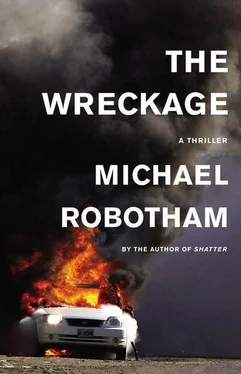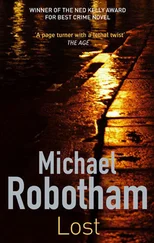Michael Robotham - The Wreckage
Здесь есть возможность читать онлайн «Michael Robotham - The Wreckage» весь текст электронной книги совершенно бесплатно (целиком полную версию без сокращений). В некоторых случаях можно слушать аудио, скачать через торрент в формате fb2 и присутствует краткое содержание. Жанр: Триллер, на английском языке. Описание произведения, (предисловие) а так же отзывы посетителей доступны на портале библиотеки ЛибКат.
- Название:The Wreckage
- Автор:
- Жанр:
- Год:неизвестен
- ISBN:нет данных
- Рейтинг книги:3 / 5. Голосов: 1
-
Избранное:Добавить в избранное
- Отзывы:
-
Ваша оценка:
- 60
- 1
- 2
- 3
- 4
- 5
The Wreckage: краткое содержание, описание и аннотация
Предлагаем к чтению аннотацию, описание, краткое содержание или предисловие (зависит от того, что написал сам автор книги «The Wreckage»). Если вы не нашли необходимую информацию о книге — напишите в комментариях, мы постараемся отыскать её.
The Wreckage — читать онлайн бесплатно полную книгу (весь текст) целиком
Ниже представлен текст книги, разбитый по страницам. Система сохранения места последней прочитанной страницы, позволяет с удобством читать онлайн бесплатно книгу «The Wreckage», без необходимости каждый раз заново искать на чём Вы остановились. Поставьте закладку, и сможете в любой момент перейти на страницу, на которой закончили чтение.
Интервал:
Закладка:
Not yet. His mobile is vibrating. London.
“Talk quickly,” he tells Sobel.
“They found North’s car.”
“What about North?”
“Traces of blood but no body.”
“You think he’s dead?”
“We have to consider the possibility.”
Chalcott scoops peanuts into his fist and inhales them between sentences. A stewardess leans over him.
“Excuse me, sir, but all electronic devices must be turned off for take-off.”
Chalcott waves her away. “What about Terracini?”
“He’s being monitored.”
“Has anything else changed?”
“We’re still looking for the girl.”
“Are you a religious man, Brendan?”
“Yes, sir.”
“Maybe you should say a prayer.”
He hangs up. Turns off his phone. Closes his eyes. In seven hours he’ll be in London and he can sort out this mess. So far he’s given his superiors a minimalist rendering of the situation. Two lessons he’s learned from twenty years with the Agency-refuse to recognize anything is amiss and keep your answers short.
Ibrahim is cleaning up. He’s hired himself an assassin, but this hasn’t changed the game. Every side has men who kill for a cause, but it’s easier dealing with a hired gun than a teenager with a hard-on for heavenly virgins and a vest packed full of explosives.
Money or God-some motives are easier to understand.
14
The Financial Herald has floor-to-ceiling glass doors and a marbled lobby fringed with indoor gardens. A lone security guard sits behind a brightly lit island counter. Gooding waves his ID card in front of a scanner and signs Luca into the register before handing him a visitor’s pass.
A lift rises above the foyer until the security guard is only a bald spot five floors below. Gooding scans his ID again to enter the newsroom. Lights trigger as they weave between cluttered desks and colored partitions that are pinned with newspaper clippings, cartoons and calendars. At the far end of the newsroom a subs desk is pooled in light and half a dozen men sit behind oversized computer screens. Most have hunched shoulders, midnight tans and the tics and twitches of ex-smokers.
Nearby the night news editor is poring over copies of the first editions, seeing what stories their rivals are running. What did they miss? Who scooped whom? It’s too late now to make any major changes. Only a big breaking event would warrant stopping the presses and dropping in a new front page.
Luca’s father had been a sub-editor on a paper in Chicago back in the hot-metal days when the printing presses would shake the entire building like a distant earthquake. Every line of type was cast in molten metal-an alloy of lead, antimony and tin-before being wedged into metal galleys on stone tables.
Luca was seven years old when he was first taken down on to “the stone.” The setters were rough-looking men in ink-stained overalls with paper hats folded from newsprint. His father would lean over the galleys, subbing the raised lead type, reading stories back to front and upside down faster than most people read normally. He cut paragraphs, trimmed sentences, added fillers and corrected mistakes.
New technology put paid to the setters and linotype machines. Now it is all done by computers in sterile, temperature-controlled rooms without the screaming machines and clanking metal.
Gooding’s desk is protected by partitions that block everything except the view from his window across the rooftops. Luca had pressed him for access to the newspaper’s archives and library. Initially, Gooding had hesitated, which puzzled Luca. Something about the journalist’s lugubrious face had registered too little when they were talking about the missing banker. Daniela had been awake to the deficit, catching the subtle change in Gooding’s tone.
“He’s not telling you everything,” she whispered to Luca as he hailed her a cab. “Be careful.” Then she had peppered his face with kisses. “I think I’m in love with you.”
“I wouldn’t recommend that.”
“Why?”
“I’m a fully paid-up pessimist.”
“I thought journalists were supposed to be idealists.”
“We start off as idealists and then we become pragmatists and finally pessimists. You can join the club. We have vacancies.”
She had laughed and he closed the cab door, giving directions to the driver.
Sitting at the computer screen, Luca waits for Gooding to type in a password.
“So where did you and Daniela meet?”
“At a hotel in Baghdad.”
“What were the first words you said to her?”
“Why?”
“I’m interested in first words. I collect them. If you remember the first words I figure you must think someone is special.”
“What were the first words you said to Lucy?”
“Pass the salt.”
Gooding laughs drunkenly, his eyes shining. Then he taps the keyboard lightly with his fingertips. A password. The archive opens. He steps back and lets Luca put in the parameters of the search, looking for links between Mersey Fidelity and Iraq. The screen refreshes. The first article is from The Economist: fifteen foreign banks had applied for a license to operate in Iraq since the relaxing of the banking laws in 2004. Five licenses had been granted-one of them to Mersey Fidelity-but none of the banks had opened local branches.
Next he searches for articles on Mohammed Ibrahim. There is a reference to his arrest in 2003, just prior to the capture of Saddam Hussein, but no mention of his accidental release from Abu Ghraib. Luca finds a black-and-white photograph taken at a military parade in Baghdad in the mid-nineties. There are three men in military uniform standing behind Saddam Hussein. The caption indicates the man on the far right is Ibrahim. He has a round face, the ubiquitous moustache and is wearing a beret at a jaunty angle.
The photo library has a dozen pictures of Yahya Maluk taken at society events: a polo tournament at Cowdray Park, a fundraiser for Great Ormond Street Hospital, the Opera at Covent Garden. Luca prints out one of the images and calls up information on Richard North, reading the various accounts of his disappearance and looking at a vodcast of a media statement made by his wife.
North’s career trajectory had been a steep curve-from public school and a third-class degree, to marrying the chairman’s daughter and heading the compliance department at Mersey Fidelity.
A new window opens on screen, headed, “News Alert.” A breaking story from Associated Press:
The search for missing banker Richard North took a new twist last night when his car was discovered in the River Lea in Hackney, East London. Police were last night examining the BMW for clues to the banker’s whereabouts. Police divers are expected to search the river at first light.
Luca looks up from the screen. Keith Gooding is dozing with his feet on the desk and his chair tilted back. Luca throws a balled-up piece of paper.
“What?”
“They just pulled Richard North’s car out of the river.”
A nerve twitches in Gooding’s jaw and something passes across his eyes that Luca can’t read. It’s the same reaction he saw at the wine bar. Gooding leans back in his chair and stares vexedly at the ceiling.
“What aren’t you telling me?”
Gooding contemplates a lie. Something sways him.
“About a month ago I called Richard North. I thought he might be a source for the book but he said he wasn’t interested. Then out of the blue, nine days ago I got a call from him. It was a Friday afternoon. He was in North London. Upset. Rambling. Saying we had to meet. I was in the middle of the afternoon news conference. We were putting the pages together for Saturday’s edition. I told him that I’d call him back, but he said it wasn’t safe to use his mobile and he wouldn’t come to the office.
Читать дальшеИнтервал:
Закладка:
Похожие книги на «The Wreckage»
Представляем Вашему вниманию похожие книги на «The Wreckage» списком для выбора. Мы отобрали схожую по названию и смыслу литературу в надежде предоставить читателям больше вариантов отыскать новые, интересные, ещё непрочитанные произведения.
Обсуждение, отзывы о книге «The Wreckage» и просто собственные мнения читателей. Оставьте ваши комментарии, напишите, что Вы думаете о произведении, его смысле или главных героях. Укажите что конкретно понравилось, а что нет, и почему Вы так считаете.












